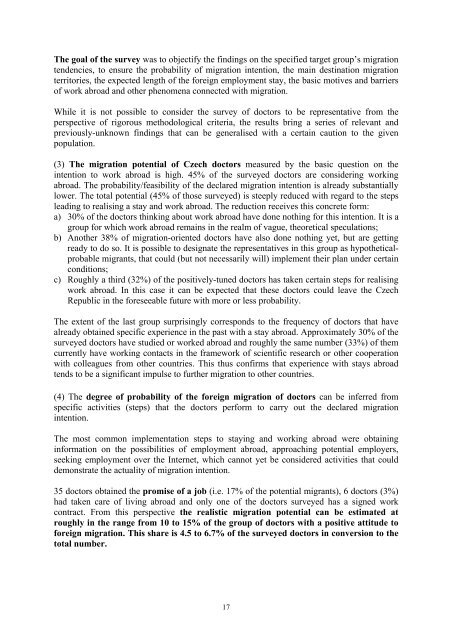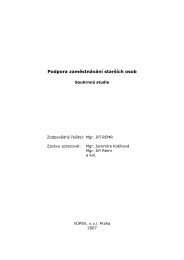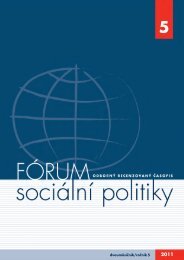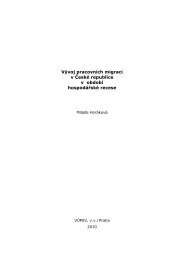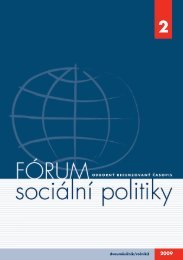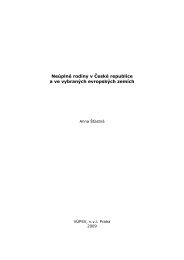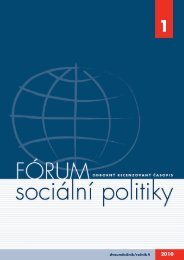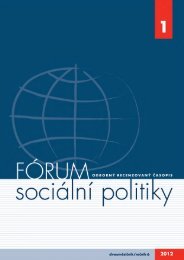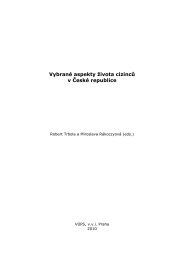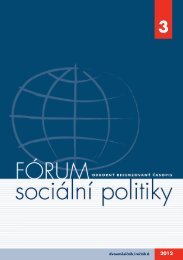The Risk of the Outflow of Doctors and IT/ICT ... - Outlook Web App
The Risk of the Outflow of Doctors and IT/ICT ... - Outlook Web App
The Risk of the Outflow of Doctors and IT/ICT ... - Outlook Web App
Create successful ePaper yourself
Turn your PDF publications into a flip-book with our unique Google optimized e-Paper software.
<strong>The</strong> goal <strong>of</strong> <strong>the</strong> survey was to objectify <strong>the</strong> findings on <strong>the</strong> specified target group’s migration<br />
tendencies, to ensure <strong>the</strong> probability <strong>of</strong> migration intention, <strong>the</strong> main destination migration<br />
territories, <strong>the</strong> expected length <strong>of</strong> <strong>the</strong> foreign employment stay, <strong>the</strong> basic motives <strong>and</strong> barriers<br />
<strong>of</strong> work abroad <strong>and</strong> o<strong>the</strong>r phenomena connected with migration.<br />
While it is not possible to consider <strong>the</strong> survey <strong>of</strong> doctors to be representative from <strong>the</strong><br />
perspective <strong>of</strong> rigorous methodological criteria, <strong>the</strong> results bring a series <strong>of</strong> relevant <strong>and</strong><br />
previously-unknown findings that can be generalised with a certain caution to <strong>the</strong> given<br />
population.<br />
(3) <strong>The</strong> migration potential <strong>of</strong> Czech doctors measured by <strong>the</strong> basic question on <strong>the</strong><br />
intention to work abroad is high. 45% <strong>of</strong> <strong>the</strong> surveyed doctors are considering working<br />
abroad. <strong>The</strong> probability/feasibility <strong>of</strong> <strong>the</strong> declared migration intention is already substantially<br />
lower. <strong>The</strong> total potential (45% <strong>of</strong> those surveyed) is steeply reduced with regard to <strong>the</strong> steps<br />
leading to realising a stay <strong>and</strong> work abroad. <strong>The</strong> reduction receives this concrete form:<br />
a) 30% <strong>of</strong> <strong>the</strong> doctors thinking about work abroad have done nothing for this intention. It is a<br />
group for which work abroad remains in <strong>the</strong> realm <strong>of</strong> vague, <strong>the</strong>oretical speculations;<br />
b) Ano<strong>the</strong>r 38% <strong>of</strong> migration-oriented doctors have also done nothing yet, but are getting<br />
ready to do so. It is possible to designate <strong>the</strong> representatives in this group as hypo<strong>the</strong>ticalprobable<br />
migrants, that could (but not necessarily will) implement <strong>the</strong>ir plan under certain<br />
conditions;<br />
c) Roughly a third (32%) <strong>of</strong> <strong>the</strong> positively-tuned doctors has taken certain steps for realising<br />
work abroad. In this case it can be expected that <strong>the</strong>se doctors could leave <strong>the</strong> Czech<br />
Republic in <strong>the</strong> foreseeable future with more or less probability.<br />
<strong>The</strong> extent <strong>of</strong> <strong>the</strong> last group surprisingly corresponds to <strong>the</strong> frequency <strong>of</strong> doctors that have<br />
already obtained specific experience in <strong>the</strong> past with a stay abroad. <strong>App</strong>roximately 30% <strong>of</strong> <strong>the</strong><br />
surveyed doctors have studied or worked abroad <strong>and</strong> roughly <strong>the</strong> same number (33%) <strong>of</strong> <strong>the</strong>m<br />
currently have working contacts in <strong>the</strong> framework <strong>of</strong> scientific research or o<strong>the</strong>r cooperation<br />
with colleagues from o<strong>the</strong>r countries. This thus confirms that experience with stays abroad<br />
tends to be a significant impulse to fur<strong>the</strong>r migration to o<strong>the</strong>r countries.<br />
(4) <strong>The</strong> degree <strong>of</strong> probability <strong>of</strong> <strong>the</strong> foreign migration <strong>of</strong> doctors can be inferred from<br />
specific activities (steps) that <strong>the</strong> doctors perform to carry out <strong>the</strong> declared migration<br />
intention.<br />
<strong>The</strong> most common implementation steps to staying <strong>and</strong> working abroad were obtaining<br />
information on <strong>the</strong> possibilities <strong>of</strong> employment abroad, approaching potential employers,<br />
seeking employment over <strong>the</strong> Internet, which cannot yet be considered activities that could<br />
demonstrate <strong>the</strong> actuality <strong>of</strong> migration intention.<br />
35 doctors obtained <strong>the</strong> promise <strong>of</strong> a job (i.e. 17% <strong>of</strong> <strong>the</strong> potential migrants), 6 doctors (3%)<br />
had taken care <strong>of</strong> living abroad <strong>and</strong> only one <strong>of</strong> <strong>the</strong> doctors surveyed has a signed work<br />
contract. From this perspective <strong>the</strong> realistic migration potential can be estimated at<br />
roughly in <strong>the</strong> range from 10 to 15% <strong>of</strong> <strong>the</strong> group <strong>of</strong> doctors with a positive attitude to<br />
foreign migration. This share is 4.5 to 6.7% <strong>of</strong> <strong>the</strong> surveyed doctors in conversion to <strong>the</strong><br />
total number.<br />
17


